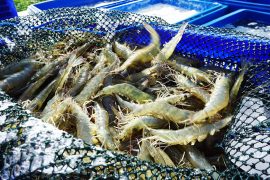
'Naughty' meal strategy could save crocodiles
In the brushlands of Western Australia, crocodiles are vital to the local culture and ecosystems. But they are also facing a fight for their survival.
A unique collaboration of science and Indigenous knowledge is driving an innovative conservation strategy aimed at saving these freshwater crocodiles (Crocodylus johnstoni) from a deadly invasive species: the cane toad.
The crocodiles hold cultural significance and are part of the traditional owners’ Dreamtime stories, and their loss would disrupt the delicate balance of local ecosystems.
Collaborative approach to protecting crocodiles
Scientists from Macquarie University, working alongside Bunuba Indigenous rangers and the Department of Biodiversity, Conservation and Attractions (DBCA) in Western Australia, have implemented a novel strategy aimed at shielding freshwater crocodiles from the devastating effects of cane toads.
Lead author Dr. Georgia Ward-Fear from Macquarie University’s School of Natural Sciences and her co-author, Professor Rick Shine, documented the successful trial of a behavioral ecology method called conditioned taste aversion (CTA).
The team has demonstrated a method that significantly reduces freshwater crocodile death rates by teaching the crocodiles to associate cane toads with a bout of food poisoning.
The cataclysmic impact of cane toads
Since cane toads were imported from South America in the 1930s, they have left a trail of destruction across northern Australia, wiping out local predator species such as goannas, snakes, and freshwater crocodiles.
“Losing freshwater crocodiles to cane toads will mean that bottom feeders in our rivers will eat all the bait such as judembah (cherrabin, a large freshwater prawn) and lardy (boney bream, an estuarine fish), leaving no fish for the barramundi and stingray to eat,” explained Ranger coordinator Paul Bin Busu, emphasizing the broader ecological impact.
How they did it: Baiting the baiters
Between 2019 and 2022, Dr. Ward-Fear and Professor Shine worked with local rangers and DBCA staff to deploy doctored cane toad carcasses across four large gorge systems in the Kimberley region of north-western Australia.
The team collected hundreds of cane toads, removed the poisonous parts, and injected the toad bodies with a nausea-inducing chemical. This ensured that freshwater crocodiles consuming the bait would experience temporary sickness but not death.
Control baits of chicken meat, without any nausea-inducing additives, were used to monitor the effectiveness of the conditioned taste aversion training.
“Being a part of the program on the ground doing the job was really good,” said Bin Busu. His team of rangers set up hundreds of bait stations along river banks, using canoes to hang and replace fresh baits while monitoring the crocodiles’ responses.
“The first three days we noticed the crocodiles were taking the cane toads, then they would go away. Then we noticed they would smell the cane toad before eating, and on the last day, we noticed that it was mostly the chicken necks getting eaten,” said Bin Busu.
Greatly reduced crocodile mortality rates
Observation and surveillance tactics yielded compelling results. Using nocturnal “spotlighting” surveys and remotely triggered wildlife cameras, the team found that areas where the aversion trials took place had greatly reduced crocodile mortality rates compared to unbaited control sites.
“Our baiting completely prevented deaths in areas where cane toads were arriving and decreased deaths by 95% in areas where toads had been for a couple of years. Effects which continued in the years following,” noted Dr. Ward-Fear.
“These are really exciting results because it provides land managers with tools to use ahead of the invasion, but also behind the invasion front,” said Sara McAllister from DBCA. “Together we’ve shown that collaborations between academics, Indigenous rangers, and land management agencies can be really effective for conservation science.”
Behavioral ecology for crocodile conservation
Bin Busu said that after the program, we seethe populations of the crocodiles are coming back, “which is a good thing to see.”
The team had previously used a similar technique to protect yellow monitor lizards from invasive predators.
Professor Shine, a senior author on the study, affirms the potency of behavioral ecology as an effective tool against invasive species, particularly in a globalized world.
“At a time when globalization has massively increased the spread of invasive species, behavioral ecology can protect vulnerable ecosystems,” said Professor Shine.
What started as a quirky experiment with an unpalatable dinner has now unfolded into a promising solution in the realm of conservation, proving that innovation and collaboration can indeed save a species.
The study is published in the journal Proceedings of the Royal Society B Biological Sciences.
—–
Like what you read? Subscribe to our newsletter for engaging articles, exclusive content, and the latest updates.
Check us out on EarthSnap, a free app brought to you by Eric Ralls and Earth.com.
—–













